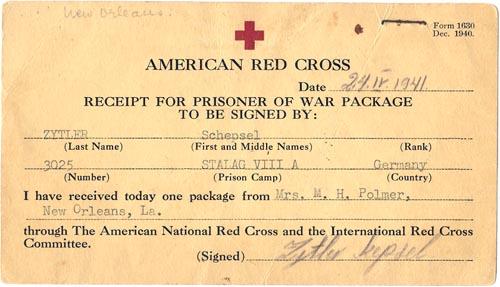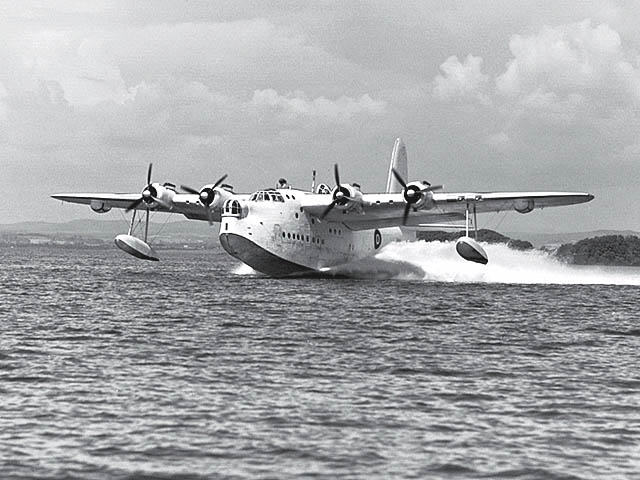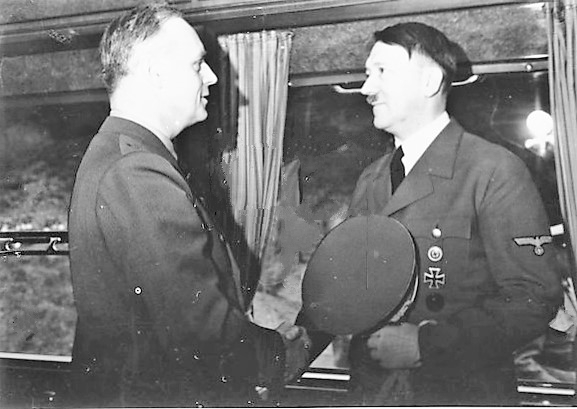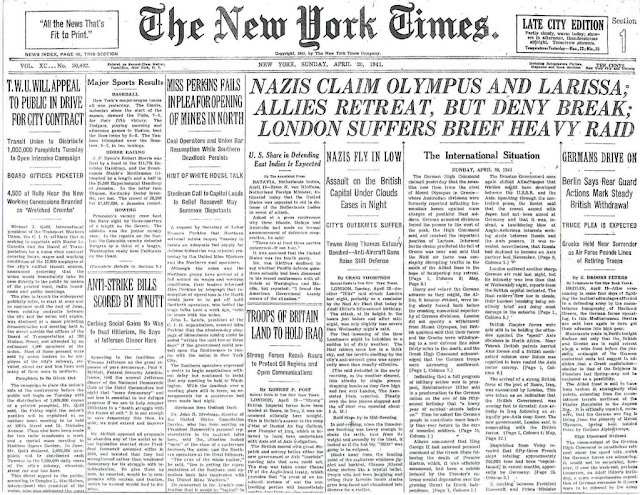Thursday 24 April 1941
 |
| Wehrmacht Troops enter Zagreb, 24 April 1941 (original caption "Zagreb - Arrival of the Germans - 04/24"). |
The British maintain a blocking detachment on the road from Larissa to Athens at the pass composed of the 4th New Zealand Brigade. The 6th New Zealand Brigade holds the east portion of the pass line and the 19th Australian Brigade holds the western sector. The German 6th Mountain Division (Generalmajor Ferdinand Schörner) attacks at 11:30 and attempts to break through the defensive line. The 5th Panzer Division also sends a battlegroup into the pass. New Zealand and Australian troops repulse these attacks, the Wehrmacht losing about 12-15 panzers. After the dark, the ANZAC troops withdraw from the pass toward Thebes, having delayed the panzers for over 24 vital hours.
There are no Greek troops involved in the Battle of Thermopylae despite the fact that the nation of Greece officially has not surrendered, only the army group in the north. This becomes a controversial issue in Greece which echoes down through the years.
Operation Demon, the evacuation of British and Commonwealth troops from mainland Greece, begins. Many ships depart from Suda Bay, Crete bound for ports on mainland Greece. On the first day, about 5200 men, mostly from the 5th New Zealand Brigade, are evacuated from Porto Rafti in East Attica, and another 8000 from Nauplia on the Peloponnese. Other ports being used for evacuations include Megara and Rafina.
The Germans continue pressing against the British line anchored at Thermopylae, but they also are making an end-around run toward the Gulf of Patras. The Greek Army was supposed to protect this sector, but it in effect no longer exists, having surrendered on the 23rd. The 1st SS Panzer Division Leibstandarte SS Adolf Hitler ("LSSAH," still of brigade-size) is racing to the southwest from Ioannina, with its ultimate objective seizing ports on the Peloponnesus which the British need for their evacuation.
The Germans also are using the port of Salonika (Thessaloniki) to occupy the islands in the Aegean. These include Samothrace, Lemnos (occupied today by elements of the 164th Division) and Thasos. The Greek garrison on Lemnos puts up a brief fight, then surrenders.
Somewhat belatedly, Bulgaria, under Tsar Boris III, declares war on Yugoslavia and Greece. The Bulgarian Army is in the process of occupying Western Thrace, and much of Macedonia.
At the War Cabinet meeting held in London, visiting Australian Prime Minister Robert Menzies "said that he was uneasy as to whether our forces in Greece... would be given sufficient protection from the air." Prime Minister Winston Churchill decides to send a telegram to Middle East Air Marshal Longmore, ordering him "to spare all the aircraft he could for Greece during the immediately critical days." Menzies himself notes darkly in his diary that "I am afraid of a disaster... Better Dunkirk than Poland or Czechoslovakia." He also wonders how anyone could have thought that the Greek expedition had "military merits," something he always argued against.
 |
| The Lublin ghetto, sealed off today. |
The Luftwaffe bombs and sinks 370-ton Royal Navy armed yacht Calanthe at Milos. There are five deaths.
The Luftwaffe bombs and sinks 2083-ton Greek freighter Popi S. at Milos.
The Luftwaffe bombs and sinks 932-ton Greek freighter Pylaros at Galaxeidion.
The Luftwaffe bombs and sinks 379-ton Greek coaster Speitsai off Psathopyrgos, Gulf of Corinth.
The Luftwaffe bombs and badly damages 4810-ton Greek freighter Point Judith off Kythnos Island. Everyone survives, and the ship officially sinks on the 26th.
The Luftwaffe bombs and sinks Greek torpedo boat Pergamos at Salamis.
The Luftwaffe bombs and sinks 2295-ton Hellas at Piraeus. This is a tragic event, as at the time the Hellas is boarding 500 British civilians and 400 wounded Allied soldiers. The Hellas catches fire and rolls over, claiming the lives of up to 500 people.
The Luftwaffe bombs and sinks 1968-ton Greek freighter Kehrea in the Bay of Frangolimano.
The Luftwaffe bombs and sinks 5528-ton Greek freighter Kyriaki at Suda Bay.
The Luftwaffe bombs and sinks 238-ton Greek coaster Manna at Aedipsos.
The Luftwaffe bombs and sinks 634-ton Greek freighter Petros at Porto Heli. The Germans later salvage it for scrap.
Greek Navy torpedo boat Aigli is scuttled in Saronis Bay.
Greek Navy torpedo boat Alkyoni is scuttled in Vouliagmeni Bay.
Greek Navy torpedo boat Arethousa is scuttled off Varkizy.
Greek Navy contraband chaser A-4 is lost on this date from unknown causes.
The Luftwaffe bombs and badly damages British submarine HMS York, which is alongside beached heavy cruiser York to supply power to its antiaircraft guns. The skipper quickly beaches the submarine, then is towed to Alexandria. Repairs at Bombay take well into 1942.
British troopship Ulster Prince, part of Operation Demon, runs aground at Nauplia. This leads to her eventual destruction because beached ships become tempting targets for the Luftwaffe.
Yugoslav submarine Nebojsca arrives in Suda Bay after escaping from the Germans. It is never put into service.
Convoys AG 14 (six troopships) and AG 15 (six troopships) depart from Alexandria bound for Suda Bay.
The Luftwaffe sends scattered raiders over the Channel after dark.
Dutch Prince Bernhard becomes an RAF pilot.
East African Campaign: The Indian 29th Infantry Brigade moves toward the Italian redoubt at Amba Alagi.
Battle of the Atlantic: President Roosevelt extends Neutrality Patrols to 26W longitude (the vicinity of Iceland) and as far south as Rio de Janeiro and orders the US Navy to report any movement of German ships west of Iceland. US Rear Admiral Robert Ghormley, President Roosevelt's Special Naval Observer in England, meets with Churchill to discuss joint operations in the Atlantic. Among the topics is the possibility of German bases on the island groups in the Atlantic, including the Canary and Cape Verde Islands. US Navy ships simply transport their sightings in the clear, and the signals invariably are picked up by Royal Navy listeners who can vector in British ships or aircraft.
US Task Force 3 (Rear Admiral Jones H. Ingram), led by light cruisers USS Cincinnati, Memphis, Milwaukee Omaha, departs from Newport, Rhode Island bound for the Caribbean and the Cape Verde Islands.
The Luftwaffe bombs and damages 5507-ton British freighter Dolius southwest of Montrose. It manages to make port in Leith.
German raider Thor makes port in Cherbourg. It is en route to Hamburg.
Convoy HG 60 departs from Gibraltar bound for Liverpool,
Royal Navy corvette HMS Polyanthus (K 47, Lt. Arthur Hague) is commissioned and submarine Sirdar is laid down.
U-127 and U-567 are commissioned, U-207 and U-504 are launched.
 |
| The 2/48th Australian Battalion near Tobruk, 24 April 1941. |
A secret cablegram dated 24 April 1941 reports:
there are about 145,000 prisoners in the Middle East excluding Abyssinia and Eritrea and figures (are) still growing. ((National Archives of Australia NAA: A 433, 1945/2/6098, 1941-1943) ).While this sounds like a positive, taking care of the vast hordes of Italian prisoners is becoming a major issue for the Allies. Many of these prisoners will wind up in Australia, causing a strain on transport and that country's resources.
At Ras el Medauuar, an Italian battalion attacks at 07:00 and manages to make its way in the perimeter wire, but after a hail of artillery fire, it surrenders. A British report notes sardonically that white flags "appeared to have become standard battle equipment of the Italian infantry at Tobruk." The British take 107 mainly Italian POWs, with the Italians losing about 40 dead. The German 15th Panzer Division then makes an attack in the same area around midday that is supported by about 18 Junkers Ju 87 Stukas, but this also is beaten off. In repelling the Axis attacks, the Australian defenders follow their typical pattern and allow the panzers to approach closely to their positions, then open fire as if in an ambush and send the attackers packing.
The British Army launches its own attack in the Gazala area which is quickly broken off but causes genuine alarm. The Royal Navy assists by bombarding the Capuzzo/Bardia area during the night, with the RAF joining in. The British obviously are building up large tank forces near Bardia and Sollum, with the German high command realizing that loss of those areas "would lead... also to the abandonment of the fight for Tobruk."
The German summary notes that the battle is developing into a "crisis-like situation" that requires "immediate reinforcement" - which the OKH (Army High Command in Berlin) notes is "currently not possible." The Tobruk battle is developing into a classic stalemate.
Churchill sends a telegram in which he continues his veiled attacks on Middle East Commander General Archibald Wavell. After making some elementary tactical suggestions - using smoke screens in Tobruk Harbor to protect shipping - he turns to his usual theme of Wavell providing insufficient information about the situation. "We still await news" of recent battles in Libya, he writes, noting "Evidently there was a severe defeat." He continues:
Surely the reports of the survivors should have made it possible to give us a coherent story of this key action. I cannot help you if you do not tell me.... While I recognize the difficulties of giving information of the fighting in Greece set out in your telegram, I cannot feel that the explanation is complete.He demands that General Henry Maitland Wilson, the commander in Greece, send a "short report" every night setting forth the positions of the troops. Of course, the troops are heading for embarkation ships now and won't be on mainland Greece much longer.
Italian torpedo boat Simone Schiaffino hits a mine and sinks off Cape Bon.
The Luftwaffe continues its heavy raids on Malta. About 30 planes spend an hour over the dockyard area and the airfields at Luqa and Hal Far. Valetta is hammered, and four auxiliary antiaircraft gunners of the 4th Battalion perish when a bomb hits their position. St. Frederic Street takes the most damage, but everyone in the shelters survives after temporarily being trapped under the rubble.
Operation Dunlop, a supply effort to Malta, begins when Force H departs from Gibraltar. HMS Ark Royal carries 22 Hurricane fighters for delivery to Malta. There also is a supply component from Alexandria, led by three battleships escorting fast transport Breconshire. Convoy ME 7 departs from Malta bound for Alexandria.
Battle of the Pacific: American, British, Dutch and Australian representatives continue to meet in Singapore to discuss a joint military strategy in the Pacific.
War Crimes: The Luftwaffe bombs and sinks 2068 ton Greek hospital ship Andros off Loutraki, Gulf of Corinth. This is another in a series of Luftwaffe attacks on hospital ships operating off the Greek mainland.
Roosevelt is in agreement with Churchill's requests. US Navy Secretary Frank Knox issues a statement:
We can no longer occupy the immoral and craven position of asking others to make all the sacrifices for this victory which we recognize as so essential to us.That, however, is US doctrine at the moment, amplified by Lend Lease. He will divert the ships of Task Force 3, which sails today from Newport, Rhode Island bound for the Caribbean, to the Cape Verde Island group.
 |
| Receipt for an American Red Cross package, signed by a POW at Stalag VIII-A in Germany, dated 24 April 1941. Many of these will be issued in the coming years. |
This meeting seems to clarify Hitler's own mind about invading the Soviet Union, or at least allay any of his underlying concerns about Germany's ability to prevail. After today, Operation Barbarossa becomes much more likely to happen. It may be that Hitler' feels that Hungarian military might would seal the deal, but Horthy's influence may be much more subtle: Hitler always has a great deal of respect for foreign leaders of stature and their assessments.
The Admiral tries to work a deal in which Hungary is granted large territorial concessions at Romanian expense - the whole of Transylvania - in exchange for its participation in upcoming Operation Barbarossa (which Horthy fervently advocates). Hitler knows that Hungarian / Romanian relations are a potentially explosive issue, refuses to commit to Hungary taking the whole of Transylvania at Romania's expense. Horthy takes this in stride. As a result of the meeting, Hitler and Horthy maintain their collaborative relationship, with Hungary benefiting directly from Hitler's conquests while trying to keep its own hands as clean as possible. The issue of Hungarian military participation in the Soviet Union remains up in the air, but relations between the two leaders remain excellent.
British Military: Churchill decides to hold regular meetings to discuss issues of the Army's tank and anti-tank weaponry. He characterizes these meetings as a "tank parliament." Among the topics covered will be the organization of Armoured Divisions.
US Military: The Detroit Arsenal Tank Plant in Detroit, Michigan delivers its first M3 medium tank to the US Army. The M3 has a 75mm main gun in a sponson mount, not an optimal arrangement because American manufacturers are not at this time capable of creating turrets large enough to handle the gun. The Germans at this time are up-gunning their Panzer IIIs and IVs to handle similar guns at Hitler's personal insistence but in normal turrets. The M3 continues the American pattern of tall and roomy tanks which the crews like - until they have to go into battle in such an exposed target. It is fair to argue that the M3 already is outclassed by tanks in Europe, but this is a controversial topic and, on the other hand, American engineering is very solid and the tanks reliable. Many of these M3s will be sent to Great Britain with different turrets and be called Grants, serving capably in the major battles in North Africa.
British Government: Late in the day, Churchill sets out on a tour of Liverpool and Manchester.
Sweden: Poet/novelist Karin Maria Boye, age 40, passes away in an apparent suicide on or about this date. She chooses a spot next to a boulder on a hill with a view near Alingsås, near Bolltorpsvägen. The boulder is made into a memorial dedicated to her.
 |
| HM Sisowath Monivong (27 December 1875 to 24 April 1941) leaving the Royal Palace in Phnom Penh. |
Holocaust: The Germans seal off the Lublin ghetto. There are 30,000 people inside, all prohibited from leaving without special work passes.
An accountant in Warsaw, Chaim Hasenfus, recalls in his diary walking innocently along Walicowa Street in the Warsaw Ghetto today when a German soldier hits him on the head with a rubber nightstick and orders him and several other Jews to load gravel on a truck. The diary entries stop soon after this and his fate is unknown.
American Homefront: Columbia Pictures releases "Penny Serenade." Produced and directed by George Stevens and starring Cary Grant and Irene Dunne, "Penny Serenade" is another in a series of 1941 Hollywood films exploring issues within marriages - a theme which seems to reflect the troubled international situation and the divisions that it is causing within the United States. The film begins with Dunne's character stating that her marriage is over, and the remainder of the film addresses how that issue resolves. Cary Grant is nominated for an Academy Award, but Gary Cooper wins it for "Sergeant York." The film strikes a chord, and radio dramatizations are produced throughout the war, with a television adaptation broadcast in January 1955.
There is another major air defense drill in New York City. Air defense officials maintain a plotting board in Manhattan that directs interceptors based at Mitchell Field, Long Island.
Painter George de Forest Brush passes away.
Future History: John Christopher Williams is born in Melbourne, Australia. He is taught guitar by his English father, then studies with Andrés Segovia in Siena, Italy in the early 1950s. John Williams goes on to become a renowned classical guitar player, and as of this writing remains active.
Richard Charles Albert Holbrooke is born in New York City. He goes on to become the only person to serve as Assistant Secretary of State for two different regions of the world: Asia from 1977 to 1981 and Europe from 1994 to 1996. Holbrooke last served as the United States Special Envoy for Afghanistan and Pakistan during 2009-2010. Richard Holbrooke passed away on 13 December 2010.
 |
| Pictured on 24 April 1941 are nine of the 11 City College of New York teachers suspended by the Joint Legislative Committee to Investigate the Educational System of the State of New York aka the "Rapp-Coudert Committee." This committee aims to stem the influence of communist influences in New York schools. The suspension of these teachers has led to student protests (Daily Worker via CUNY.EDU). |
April 1941
April 1, 1941: Rommel Takes Brega
April 2, 1941:Rommel Takes Agedabia
April 3, 1941: Convoy SC-26 Destruction
April 4, 1941: Rommel Takes Benghazi
April 5, 1941: Rommel Rolling
April 6, 1941: Operation Marita
April 7, 1941: Rommel Takes Derna
April 8, 1941: Yugoslavia Crumbling
April 9, 1941: Thessaloniki Falls
April 10, 1941: USS Niblack Attacks
April 11, 1941: Good Friday Raid
April 12, 1941: Belgrade and Bardia Fall
April 13, 1941: Soviet-Japanese Pact
April 14, 1941: King Peter Leaves
April 15, 1941: Flying Tigers
April 16, 1941: Battle of Platamon
April 17, 1941: Yugoslavia Gone
April 18, 1941: Me 262 First Flight
April 19, 1941: London Smashed
April 20, 1941: Hitler's Best Birthday
April 21, 1941: Greek Army Surrenders
April 22, 1941: Pancevo Massacre
April 23, 1941: CAM Ships
April 24, 1941: Battle of Thermopylae
April 25, 1941: Operation Demon
April 26, 1941: Operation Hannibal
April 27, 1941: Athens Falls
April 28, 1941: Hitler Firm about Barbarossa
April 29, 1941: Mainland Greece Falls
April 30, 1941: Rommel Attacks
2020










